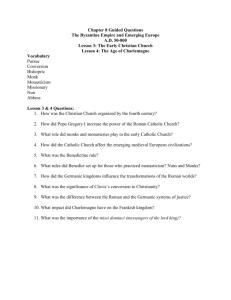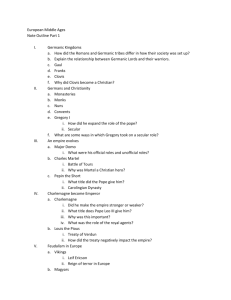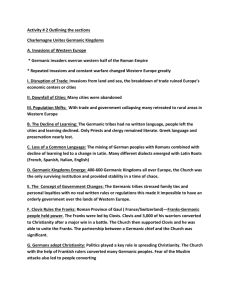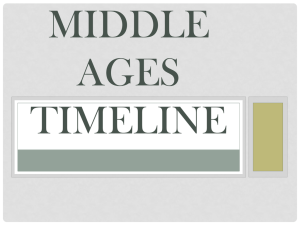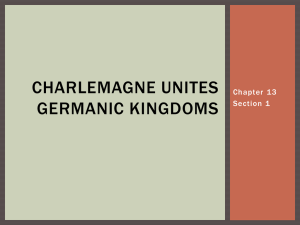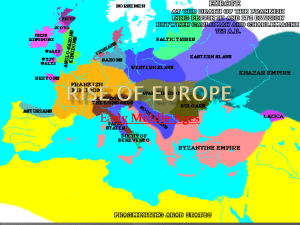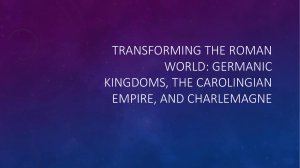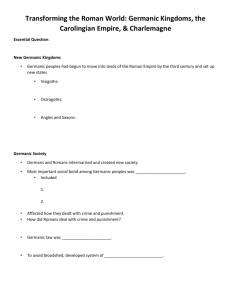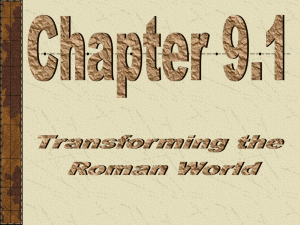Name: Date: ______ Period: ______ Chapter 13.1 Germanic
advertisement
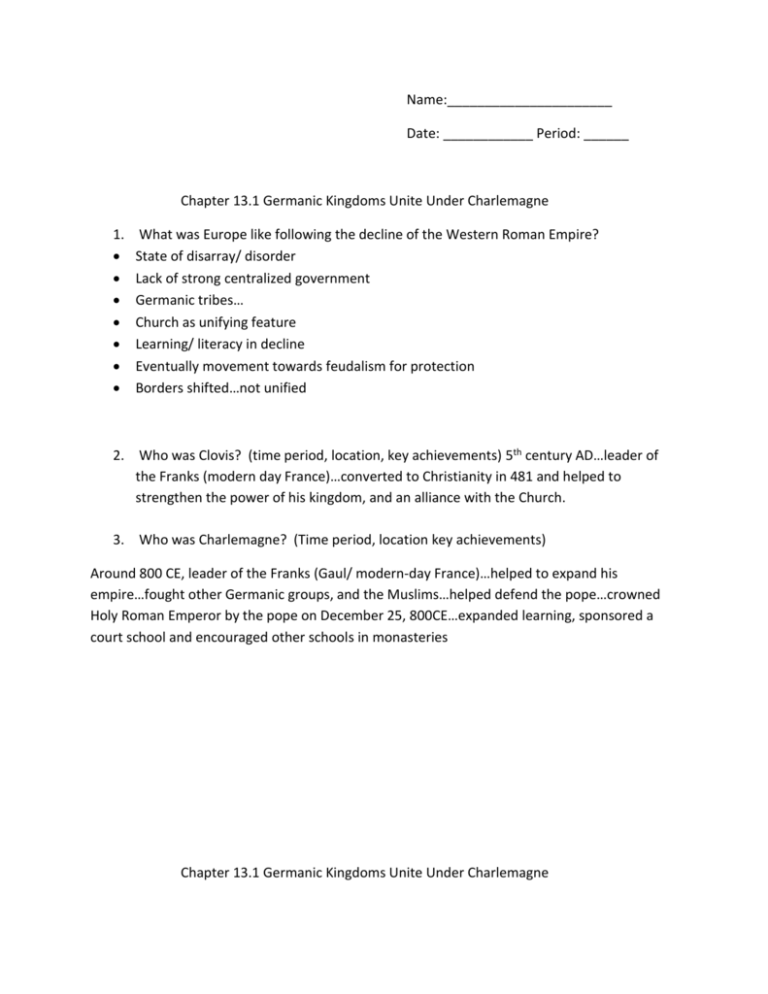
Name:______________________ Date: ____________ Period: ______ Chapter 13.1 Germanic Kingdoms Unite Under Charlemagne 1. What was Europe like following the decline of the Western Roman Empire? State of disarray/ disorder Lack of strong centralized government Germanic tribes… Church as unifying feature Learning/ literacy in decline Eventually movement towards feudalism for protection Borders shifted…not unified 2. Who was Clovis? (time period, location, key achievements) 5th century AD…leader of the Franks (modern day France)…converted to Christianity in 481 and helped to strengthen the power of his kingdom, and an alliance with the Church. 3. Who was Charlemagne? (Time period, location key achievements) Around 800 CE, leader of the Franks (Gaul/ modern-day France)…helped to expand his empire…fought other Germanic groups, and the Muslims…helped defend the pope…crowned Holy Roman Emperor by the pope on December 25, 800CE…expanded learning, sponsored a court school and encouraged other schools in monasteries Chapter 13.1 Germanic Kingdoms Unite Under Charlemagne I. Invasions Trigger Changes in Western Europe End of 5th century- invaders from many different Germanic groups overran the western half of the Roman Empire…repeated invasions and constant warfare sparked new trends Disruption of Trade- businesses collapsed, money became scarce Downfall of Cities- with fall of Roman Empire, cities were abandoned as centers of administration Population Shifts- nobles retreated to the rural areas…Roman cities left without strong leadership…population of western Europe became mostly rural A. The Decline of Learning Germanic invaders could not read or write Education among former Roman subjects also declined Few people were literate: priests and church officials (and not always them either) Knowledge of Greek almost lost…few people could read Greek works of literature, science, and philosophy Germanic Tribes: rich oral tradition of songs and legends, but no written language B. Loss of a Common Language As German-speaking peoples mixed with the Roman population, Latin began to change o No longer understood from region to region o Different dialects developed By 800’s- French, Spanish, and other Roman-based languages had evolved from Latin Development of various languages mirrored the continued breakup of a once unified empire II. Germanic Kingdoms Emerge In years of upheaval between 400 and 600, small Germanic kingdoms replaced Roman provinces o Borders of kingdom changed constantly with the fortunes of war CHURCH was an institution that survived the fall of the Roman Empire o During time of political chaos, Church provided order and security A. The Concept of Government Changes With shifting boundaries, entire concept of government changed Loyalty to public government and written law had unified Roman society Family ties and personal loyalty bound Germanic society together o Germanic peoples lived in small communities o Governed by unwritten rules and traditions o Every Germanic chief led a band of warriors, who had pledged their loyalty to him o In peacetime, warriors lived in lord’s hall B. III. A. B. Provided them with food, weapons, and treasure o Considered a disgrace to outlive their lord (in battle) Germanic warriors did not feel the same allegiance to a king or an official Germanic stress on personal ties made it impossible to establish orderly government for large territories Roman province of Gaul, Germanic people called the Franks, held power The Franks Under Clovis Clovis’s wife, Clothilde, urged him to convert to her faith of Christianity 496- Clovis led his warriors into battle against another Germanic army o Fearing defeat, Clovis appealed to the Christian God…”I long to believe in Thee. Only, please deliver me from my enemies.” o Tide of battle shifted, and the Franks won o Clovis and 3,000 of his warriors then asked a bishop to baptize them Church in Rome welcomed Clovis’s conversion and supported his military campaigns against other Germanic peoples 511: Clovis united the Franks into one kingdom Germanic Peoples Adopt Christianity Politics played a key role in spreading Christianity By 600- Church, with help of Franks, had converted many Germanic peoples Missionaries also helped spread Christianity o in Southern Europe, fear of coastal attacks by Muslims also spurred many people to become Christians Monasteries and Convents Monasteries- religious communities o Monks in monasteries o Nuns in convents 520: Benedict (Italian monk), wrote a book about a strict yet practical set of rules for monasteries o Benedict’s sister, Scholastica, headed a convent Monks and nuns dedicated their lives to prayer and good works…vows of charity, chastity, obedience Gregory I Expands Papal Power 590- Gregory I became pope. o As head of the Church in Rome, he broadened the authority of the papacy, (pope’s office) beyond spiritual role o Papacy also became secular (worldly) o Pope’s palace was the center of Roman government IV. A. B. V. o Gregory used Church revenues to raise armies, repair roads, and help the poor…negotiated peace treaties o Gregory began to act as the mayor of Rome o Gregory felt the entire region from Italy to England, from Spain to western Germany, fell under his responsibility o Strengthened the vision of Christendom o Churchly kingdom, ruled by a pope, was a central theme of the Middle Ages o Secular rulers also set their sights on expanding their own political kingdoms A European Empire Evolves After the Roman Empire dissolved, small kingdoms sprang up all over Europe o Ex: England splintered into 7 tiny kingdoms Clovis had the foundations of a kingdom in Gaul…and helped strengthen the Merovingian Dynasty Clovis’s Descendants By 700- Major Domo (mayor of the palace) was the most powerful person in the kingdom…in charge of royal households and estates…unofficially, he commanded armies and made policy 719-mayor of the palace named Charles Martel (Charles the Hammer)- held more power than the king…Charles Martel extended the Franks’ reign and defeated a Muslim raiding party from Spain at the Battle of Tours in AD 732 (halted Muslim advance further into Europe) When Charles Martel died, power passed to his son, Pepin the Short o Pepin wanted to become king o Helped out the pope, by fighting the Lombards o Pope anointed Pepin “king by the grace of God.” o Began the Carolingian Dynasty- 751 to 987 Charlemagne Extends Frankish Rule Pepin the Short died in 768…Charlemagne then seized control of entire kingdom after his brother, Carloman’s death Charlemagne Takes Center Stage Charlemagne fought he Muslims in Spain and tribes from other Germanic kingdoms o Conquered new lands to the south and east… o Charlemagne spread Christianity o Reunited Western Europe for the first time since the Byzantine Empire 2/3 of all of Italy, all of present-day France, small part of Spain, and all of German Saxony o Charlemagne was the most powerful king in western Europe 800: Charlemagne traveled to Rome to crush an unruly mob that attacked the pope…in gratitude, Leo III crowned him emperor o Holy Roman Emperor o Event signaled the joining of Germanic power, the Church, and the heritage of the Roman Empire A. Charlemagne’s Government Strengthened royal power by limiting the authority of the nobles Sent out royal agents to govern his empire o Made sure that the powerful landholders called counts, governed their counties justly Charlemagne regularly visited every part of his kingdom…judged cases, and settled disputes B. Cultural Revival Encouragement of learning Surrounded himself with scholars Charlemagne opened a palace school Ordered monasteries to open schools…expanded their libraries…handwritten copies…scribes C. Charlemagne’s Heirs are Weak Rulers Charlemagne died in 814…crowned surviving son, Louis the Pious…ineffective ruler o Louis 3 sons: Lothair, Charles the Bald, and Louis the German o Sons fought one another for the empire o 843- Treaty of Verdun- pact divided Charlemagne’s empire into three kingdoms Carolingian kings lost power…central authority broke down
